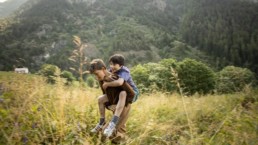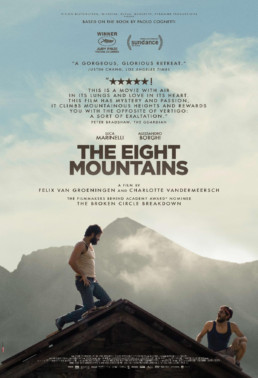The Eight Mountains
Based on the popular Italian novel, 'The Eight Mountains' is a visceral, heart-stirring nod to male friendship and the ties that bind us.
Co-directors Felix van Groeningen and Charlotte Vandermeersch bring Paolo Cognetti’s novel The Eight Mountains to life delicately and compassionately in this stunning adaptation based on his famous Italian novel. Written for the screen by van Groeningen and Vandermeersch, the film takes the literature’s words and transforms them into a visceral, heart-stirring nod to male friendship and the ties that bind us.
The Eight Mountains is a love story about friendship. Two boys from different walks of life, Pietro (Luca Marinelli) and Bruno (Alessandro Borghi) strike up an unusual relationship after first meeting as 12-year-olds. Pietro is a city boy, whose familial aspirations include a career-driven life beyond their modest hometown. Bruno, on the other hand, has grown up in a remote mountain village, the last child of the nearly-forgotten community, and has no desire to ever leave. Through the years (which turns into decades) we follow Pietro and Bruno as they grow up, navigate the complexities of young adulthood, and fall in and out of each other’s lives just as the tide washes to and from the shore.
Relationship reassignment is a normal part of life. Many of us have outgrown the childhood friendships that we swore would last forever; the BFF necklaces stuffed in the back of the dresser drawer instead of proudly displayed hanging from our necks. It’s a gradual mourning that sometimes we don’t realize has happened until the memories of our time together become more than the actual time spent. Then there are the people we seem to have a soul contract with, the people that will stay in our lives forever. This is the bond that Pietro and Bruno share. Throughout all of life’s inconsistencies and hardships, true friendship will always rise.
Another through-line in this coming-of-age story is the relationship dynamic between fathers and sons. Both boys had complicated family dynamics which they played out in their adult lives in different ways. Masculine trauma and the expectation to uphold a legacy, abandonment issues, grief, and loss are just some of the threads pulled throughout the film.
The world of The Eight Mountains is stunning, both visually and through the film’s use of music. Nature is a major theme in the film, and the directors do a wonderful job of contrasting its beauty and melancholy so elegantly. The snowy mountaintops, nighttime bonfires, and cattle farms evoke a sense of spiritual easiness, reminding us that people and the environment can co-exist peacefully.
Adding to this ethereal mood is the score by Daniel Norgren, who directors Felix van Groeningen and Charlotte Vandermeersch consider the Swedish version of Bruno. They have stated, “Like Bruno, he lives far away from the crowd, in the woods, on his own mountain, building his own house and his own music studio. He finds his inspiration wandering in the woods.” This expression of isolation is felt throughout the score, it’s vulnerable in all the right ways and hits all of the right notes, especially the angelic recurring piano theme.
The Eight Mountains offers many nuggets of wisdom, and at least one is bound to resonate with you personally. One moment in the film has stuck with me since first watching, and I’ve been contemplating this rhetorical question ever since: “At the center of the world is the tallest mountain, the Sumeru, which is surrounded by eight seas and eight mountains. The question is: who has learned the most, the one who has been to all eight mountains, or the one who has reached the top?” There is no wrong answer here, and our past may dictate what we value as more impressive. However, we should remember that progress isn’t linear, accomplishments are relative, and life is more enjoyable with a good friend.
Morgan Rojas
Certified fresh. For disclosure purposes, Morgan currently runs PR at PRETTYBIRD and Ventureland.


